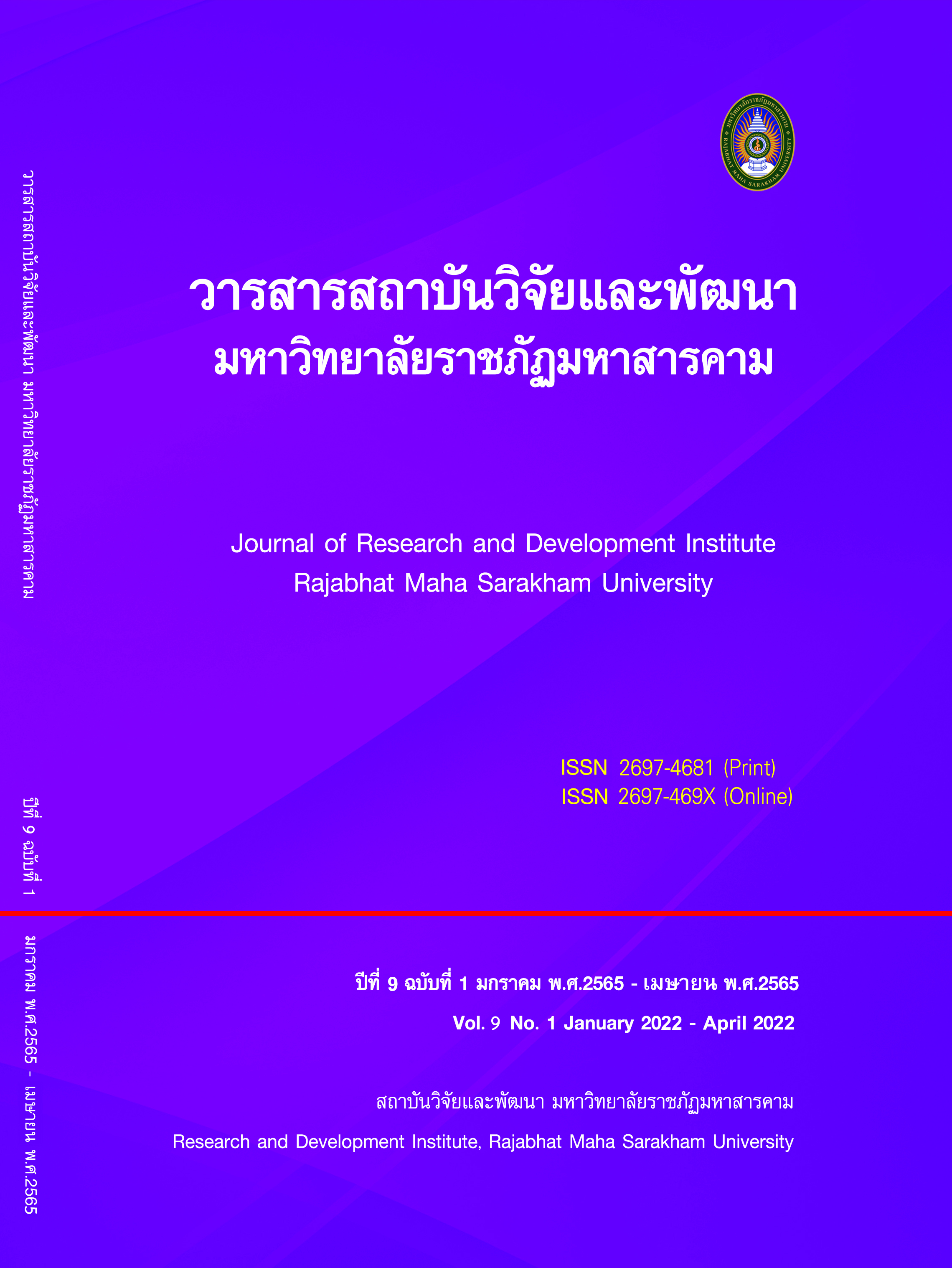The development of community-based learning activities on self-sufficiency Grade 4
Keywords:
Community-based learning, Academic achievement, Living a self-sufficient lifeAbstract
This research aims to 1) Developing learning activities using community-based About living a self-sufficient life Grade 4 To be effective according to the criteria 75/75 2) Study the effectiveness index of learning activities Using the community as a base About living a self-sufficient life Grade 4 3) Compare academic achievement Before and after class The students have been learning activities using the community as a base About living a self-sufficient life 4) Study student satisfaction Towards the organization of community-based learning activities About living a self-sufficient life The sample group was students Grade 4 Horse stable house school In the semester 2 year 2563 number 1 Classroom number 9 people Research tools include 1) Community-based learning activities plan 7 2) Optional type of achievement test 4 Number of Options 20 Clause 3) Questionnaire on student satisfaction with learning Is an approximate scale (Rating Scale) 5 Number level 15 Clause The statistics used for data analysis were percentage, mean, standard deviation and test statistics. Wilcoxon singed Rank Test
The results showed that 1) Get a number of learning management plans 7 Each plan contains Standard essence, metric Learning purpose Learning Learning management process Learning activities Media / learning resources Measuring and evaluating learning outcomes Notes after learning activities Suitability assessment results Have mean since 4.90-5.0 Which is at the most appropriate level and the results were obtained for efficiency 85.63 / 76.83 Which meet the specified criteria 2) The effectiveness index of the community-based learning activities. About living a life of sufficiency equal to 0.86 Shows that students have progressed in their studies About living a self-sufficient life Increase 86.0 3) Grade 4 students The place is taught by organizing learning activities using the community as a base for self-sufficiency life. Had a statistically higher academic achievement score than before studying at the .05 4) Found that students grade 4 They were satisfied with the community-based learning activities. Overall at the highest level ( = 4.7, S.D. =0.40) When considered individually, it was found that the item with the highest mean was 4,5,6 ( = 5, S.D. = 0) Where the second is 1,2,3,6,7,9,10 (=4.6, S.D. =0.57)
Key word Community-based learning Academic achievement Living a self-sufficient life
References
Ban Khok Ma School. (2019). Assess the quality of internal education (LAS ) Ban Khok Ma School 2019. Maha Sarakham: Ban Khok Ma School.
Dechakhupt, P. (2011). Teaching that focuses on learners is important. Bangkok: The master group management company limited.
Intawaree, C. (2015). A study of community-based education management on local history for prathomsuksa 4 students in Wat Bot School, Singburi province. Pathum Thani: Rajamangala University of Technology Thanyaburi.
Khammani. T. (2000). Pedagogical Sciences: Knowledge for effective organization of learning processes. Bangkok: Chulalongkorn University.
Ministry of Education. (2008). Basic Education Core Curriculum 2008. Bangkok: The Agricultural Cooperative Federation of Thailand. Limited.
Palliang, K., & Chittranun, T. (2017) The study of learning achievement, Subject: Social Studies Topic: Geography of North America, Mattayomsuksa 3 by using Student Teams-Achievement Divisions activity (STAD). Maha sarakham: Maha sarakham University.
Panich, V. (2012). 21st Century Skills. Bangkok: Sodsri Saritwong Foundation.
Phailom, P. (2019). Learning Activity Model on Urban Community base The ability to manage the environment, A study of Primary 4. Journal of Educational Technology and Communications Faculty of Education Mahasarakham University. Vol. 2 No. 5: May - August 2019.
Srisa-ard, B. (2003). Curriculum Development and Curriculum Research. Bangkok: Suwiriyasan.
Thongkao, K. (2018). Community-based Education Management =CBEM. [Online]. www.dpu.ac.th/ces/download.php?file name=1377584927.docx. [17 July 2018]
Wangha, U., et al. (2018). Development of Social Studies Instructional Model by Applying Community-Based Learning Approach and Constructivism to Enhance Analytical Thinking and Communication Abilities for Mattayomsuksa Three Students of Local Government Organization School. Journal of Education Vol.29 No.1 January - April 2018.
Downloads
Published
How to Cite
Issue
Section
License
Copyright (c) 2022 Journal of Research and Development Institute Rajabhat Maha Sarakham University

This work is licensed under a Creative Commons Attribution-NonCommercial-NoDerivatives 4.0 International License.
Articles that are published are copyrighted by the authors of the articles







